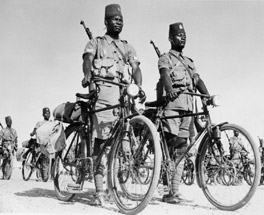THE WAR EFFORT
 Bicycle troops © Inforcongo Bicycle troops © InforcongoRMCA |
During the Second World War, Congolese soldiers of the Force Publique's Expeditionary Force are sent to fight side-by-side with European soldiers in Burma, Egypt, Ethiopia, Madagascar and the Middle East. This transforms their understanding of relations between Africans and Europeans, and could threaten colonial order. As for Congolese in Congo, they question the war repeatedly and receive few answers. Rumours spread – such as the existence of European 'cannibals' – and Messianic movements challenging the colonial order multiply. The colonial administration resorts to forced labour: each man becomes a civilian 'recruit'. This war effort exhausts the population and plunges civil society into social unrest: strikes, mutinies and rebellions proliferate, and the harsh response of Belgian authorities worsens relations between the colonists and the colonized. The violent, radical protests of the masses contrast with the more subdued protests of 'évolués' ('civilized Congolese'). WAR DEBTSThe colonial administration recognizes that it owes a debt to the Congolese: they contributed to the war effort and suffered more than Belgians in Congo did. They deserve to be repaid. After the war, it launches 'La Voix du Congolais' ('The Congolese Voice'), a review for 'évolués'. By doing this, the Belgian administration is favouring the Congolese elite, whose protests were more moderate than those of the masses. Fomenting this division among the Congolese people prevents the creation of a popular movement that could push the colonial administration to recognize the rights of all Congolese. |


